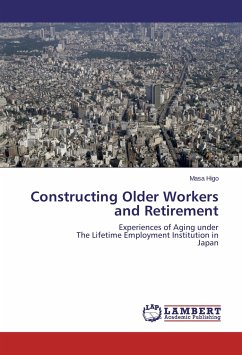Today, against the backdrop of the demographic pressures to delay the retirement of older workers, sociologists of aging and gerontologists have begun exploring the impact of national labor market institutions on individual workers' experiences of aging and growing older at the workplace and in the labor market at large. This book has contributed to the literature by demonstrating that, with its persistent mandatory retirement policies, the lifetime employment institution in Japan serves as an intensive age-based social control mechanism that has constructed and reproduced 'older workers' in the country's labor force. Based on empirical research findings, this book argues that the Japanese government should find ways to mitigate the social exclusion, marginalization, and stigmatization that workers experience in their post-mandatory retirement working lives.
Bitte wählen Sie Ihr Anliegen aus.
Rechnungen
Retourenschein anfordern
Bestellstatus
Storno








